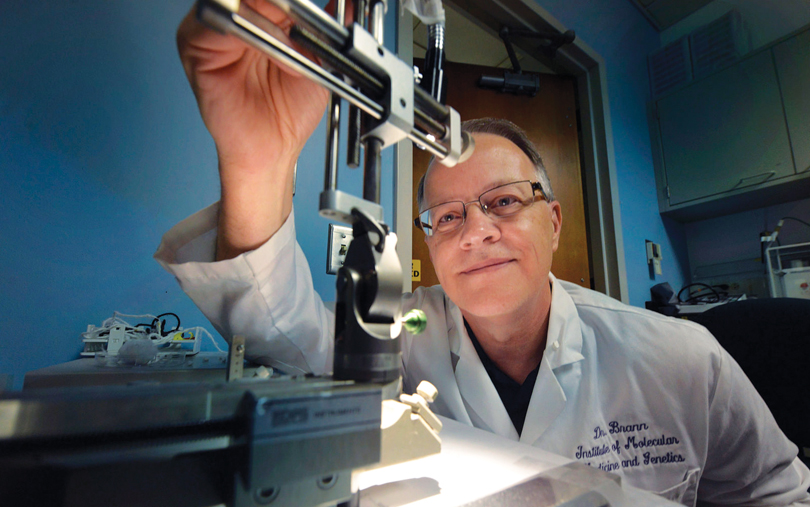Darrell Brann, Phd
Regents' Professor ,
,
Virendra B. Mahesh, PhD, D.Phil., Distinguished Chair in Neuroscience
Department of Neuroscience & Regenerative Medicine
Mailing Address:
Dept. of Neuroscience & Regenerative Medicine
1120 15th Street, Rm. CA4004
Medical College of Georgia at Augusta University
Augusta, GA 30912
Phone: 706- 721-7779
E-mail: dbrann@augusta.edu
Education:
1984 Henderson State University: B.A. in Biology (Cum Laude)
1990 Medical College of Georgia: Ph.D. (with Distinction) in Endocrinology/Neuroendocrinology,
1990.
Postdoctoral Training:
1990-1991 Medical College of Georgia, Postdoctoral Fellow
1991-1992 Medical College of Georgia, Assistant Research Fellow
Research Interests:
Dr. Brann’s research has contributed significantly to enhancing understanding of 17b-estradiol (estrogen) signaling mechanisms and actions in the brain, including its anti-oxidative stress, anti-inflammatory, and neuroprotective actions in the brain.
His recent work has focused upon elucidating the role of “brain-derived” estrogen, from both neurons and astrocytes, in neural plasticity, neuroinflammation, astrocyte biology, and neuronal survival, as well as in control of cognitive function.
In addition, his recent work has also focused on elucidating the role of astrocytes and the ROS-generating enzyme, NADPH oxidase in oxidative stress, stroke and traumatic brain injury.
Current projects:
1) Brain aromatase in neurological function and disease
2) Mechanisms of estrogen signaling and neuroprotection
3) Characterization and therapeutic targeting of A1 astrocytes in traumatic brain
injury
Brann Lab Members:
Yujiao Lu, PhD Student
Jing Wang, Research Scientist
Collaborations at Augusta University:
Kris Dhandapani, PhD
Quanguang Zhang, PhD
Collaboration at University of Texas Health Science Center at San Antonio:
Ratna Vadlamudi, PhD
Collaboration at Rush University Medical Center:
Zoe Arvanitakis, MD
David Bennett, MD
Published Papers:
- Zhang QG, Han D, Wang RM, Dong Y, Yang F, Vadlamudi R, Brann DW. (2011) C terminus of HSC70-interacting protein (CHIP)-Mediated Degradation of Estrogen Receptor-a and the critical period hypothesis of estrogen neuroprotection. Proceedings of the National Academy of Sciences USA, 108 (35) E617–E624. (Cover Article) (Commentary in PNAS 2011 Aug 30;108(35):14375-6.) (Cited in Faculty of 1000). (PMID: 21808025).
- Sareddy GR, Zhang QG, Wang R, Scott E, Zou Y, O'Connor JC, Chen Y, Dong Y, Vadlamudi RK, and Brann DW. (2015) Proline-, Glutamic Acid-, and Leucine-Rich Protein 1 (PELP1) Mediates Estrogen Rapid Signaling and Neuroprotection in the Brain. Proceedings of the National Academy of Sciences USA, 2015 Dec 1;112(48):E6673-82. (Cited in Faculty of 1000 Biology). PMID: 26627258.
- Ma M, Wang J, Zhang QG, Wang R, Dhandapani KM, Vadlamudi RK, Brann DW. (2017) NADPH Oxidase in brain injury and neurodegenerative disorders. Molecular Neurodegeneration, Volume 12, article 7. PMID: 28095923.
- Wang J, Ma MM, Dhandapani KM, Brann DW. (2017) Regulatory Role of NADPH Oxidase 2 in the Polarization Dynamics and Neurotoxicity of Microglia after Traumatic Brain Injury. Free Radical Biology and Medicine 113:119-131. PMID: 28942245.
- Lu Y, Sareddy GR, Wang R, Zhang Q, Wang J, Wang R, Yong L, Dong Y, Zhang Q, Liu J, OConnor J, Xu J, Vadlamudi RK, Brann DW. (2019) Neuron-derived estrogen regulates synaptic plasticity and memory. Journal of Neuroscience, 39(15):2792-2809. (As of 5-8-19 over 48,000 views and in the top 5% of all research outputs scored by Altmetric).